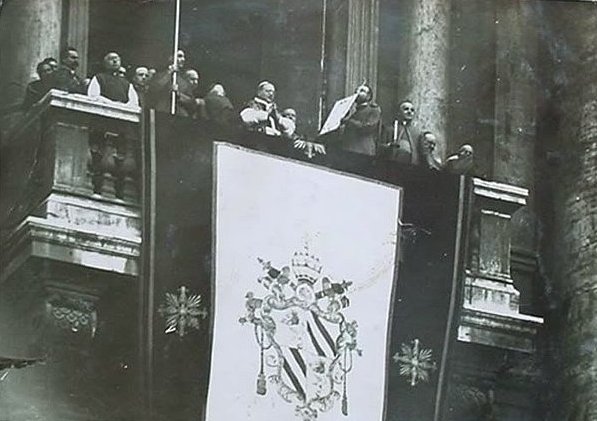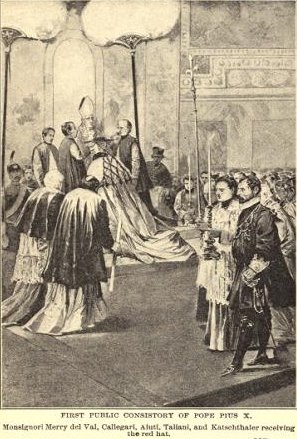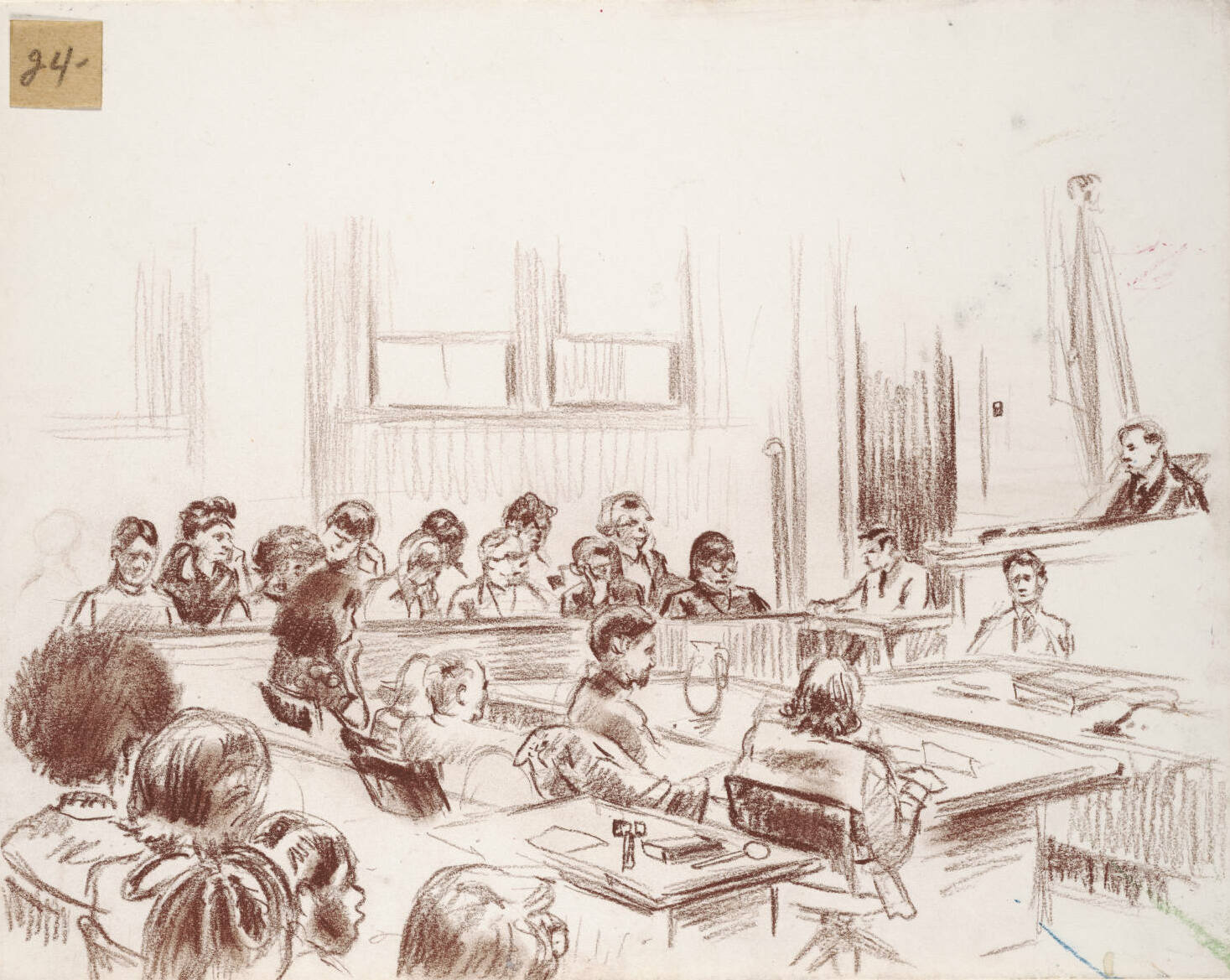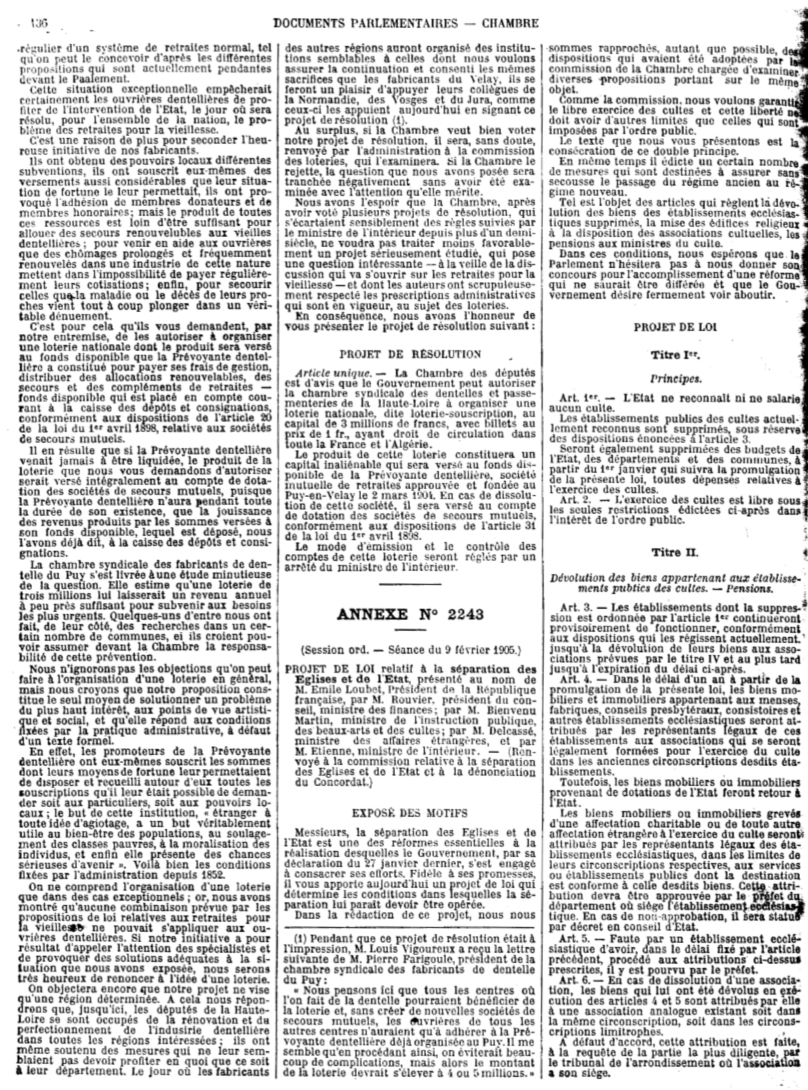|
Louis-Ernest Dubois
Louis-Ernest Dubois (1 September 1856 – 23 September 1929) was a Roman Catholic Cardinal and Archbishop of Paris. He played a leading role in the period of adjustment to the separation of Church and State in France. Early life He was born in Saint-Calais (Sarthe) to a family from the adjacent commune of St. Gervais. He was educated at the Seminary of Le Mans. He was ordained priest on 20 September 1879. After his ordination he worked in the diocese of Le Mans from 1879 until 1898. He was editor of ''Semaine du fidèle'' in 1888. He served as Vicar general of the diocese of Le Mans from 1898 until 1901. Episcopate Pope Leo XIII appointed him Bishop of Verdun on 18 April 1901. Verdun was one of only two French cities where the bishop was not obliged to leave his palace following the 1905 French law on the Separation of the Churches and the State. He was promoted to Archbishop of Bourges in 1909. He served in Bourges until he was transferred to Archbishop of Rouen on 13 Mar ... [...More Info...] [...Related Items...] OR: [Wikipedia] [Google] [Baidu] |
Cardinal (Catholicism)
A cardinal ( la, Sanctae Romanae Ecclesiae cardinalis, literally 'cardinal of the Holy Roman Church') is a senior member of the clergy of the Catholic Church. Cardinals are created by the ruling pope and typically hold the title for life. Collectively, they constitute the College of Cardinals. Their most solemn responsibility is to elect a new pope in a conclave, almost always from among themselves (with a few historical exceptions), when the Holy See is vacant. During the period between a pope's death or resignation and the election of his successor, the day-to-day governance of the Holy See is in the hands of the College of Cardinals. The right to participate in a conclave is limited to cardinals who have not reached the age of 80 years by the day the vacancy occurs. In addition, cardinals collectively participate in papal consistories (which generally take place annually), in which matters of importance to the Church are considered and new cardinals may be created. Cardina ... [...More Info...] [...Related Items...] OR: [Wikipedia] [Google] [Baidu] |
Saint-Gervais-de-Vic
Saint-Gervais-de-Vic () is a commune in the Sarthe department in the region of Pays de la Loire in north-western France. See also *Communes of the Sarthe department The following is a list of the 354 communes of the Sarthe department of France. The communes cooperate in the following intercommunalities (as of 2020):Communes of Sarthe {{Sarthe-geo-stub ... [...More Info...] [...Related Items...] OR: [Wikipedia] [Google] [Baidu] |
Pope Pius XI
Pope Pius XI ( it, Pio XI), born Ambrogio Damiano Achille Ratti (; 31 May 1857 – 10 February 1939), was head of the Catholic Church from 6 February 1922 to his death in February 1939. He was the first sovereign of Vatican City from its creation as an independent state on 11 February 1929. He assumed as his papal motto "Pax Christi in Regno Christi," translated "The Peace of Christ in the Kingdom of Christ." Pius XI issued numerous encyclicals, including '' Quadragesimo anno'' on the 40th anniversary of Pope Leo XIII's groundbreaking social encyclical '' Rerum novarum'', highlighting the capitalistic greed of international finance, the dangers of socialism/communism, and social justice issues, and ''Quas primas'', establishing the feast of Christ the King in response to anti-clericalism. The encyclical ''Studiorum ducem'', promulgated 29 June 1923, was written on the occasion of the 6th centenary of the canonization of Thomas Aquinas, whose thought is acclaimed a ... [...More Info...] [...Related Items...] OR: [Wikipedia] [Google] [Baidu] |
1922 Papal Conclave
The 1922 papal conclave was held following Pope Benedict XV's death from pneumonia on 22 January 1922 after a reign of eight years. 53 of the 60 cardinals assembled in the Sistine Chapel eleven days later on 2 February to elect his successor. They chose Cardinal Achille Ratti on the fourteenth ballot, held on the fifth day of the conclave. He took the name ''Pius XI''. The new pope immediately revived the traditional public blessing from the balcony, ''Urbi et Orbi'' ("to the city and to the world"), which his predecessors had eschewed since the loss of Rome to the Italian state in 1870. The four non-European cardinals did not participate in the conclave. Three of them arrived too late and one did not attempt the journey. Three weeks after his election, Pope Pius XI issued rules extending the time between the death of a pope and the start of the conclave in order to increase the likelihood that cardinals from distant locations could participate in the next conclave. Background T ... [...More Info...] [...Related Items...] OR: [Wikipedia] [Google] [Baidu] |
Papal Consistory
In the Roman Catholic Church a consistory is a formal meeting of the College of Cardinals called by the pope. There are two kinds of consistories, extraordinary and ordinary. An "extraordinary" consistory is held to allow the pope to consult with the entire membership of the College of Cardinals. An "ordinary" consistory is ceremonial in nature and attended by cardinals resident in Rome. For example, the pope elevates new cardinals to the College at a consistory; Pope Francis has called consistories for ceremonies of canonization. A meeting of the College of Cardinals to elect a new pope is not a consistory, but a conclave. History The term ''consistory'' comes from the la, con-sistere; "stand together".''Papal Consistory'' by Kevin Knight (Catholic Encyclopedia, 2009) Early popes conferred with their Roman presbytery which included ... [...More Info...] [...Related Items...] OR: [Wikipedia] [Google] [Baidu] |
Pro Hac Vice
In the legal field, ''pro hac vice'' () is a practice in common law jurisdictions whereby a lawyer who has not been admitted to practice in a certain jurisdiction is allowed to participate in a particular case in that jurisdiction. Although ''pro hac vice'' admission is available in every American jurisdiction,, Cornell University Law School (Accessed July 13, 2015) (discussing existence of pro hac vice statutes in all fifty states) civil law jurisdictions generally have much stricter rules for multi-jurisdictional practice. The term is used by the Catholic Church as well. Origins ''Pro hac vice'' is Latin "for this occasion" or "for this event" (literally, "for this turn"). The origins of t ...[...More Info...] [...Related Items...] OR: [Wikipedia] [Google] [Baidu] |
Santa Maria In Aquiro
Santa Maria in Aquiro is a church in Rome, Italy. It is dedicated to Mary, mother of Jesus, and is located on Piazza Capranica. The church is ancient – it was restored by Pope Gregory III in the 8th century, and thus must have existed before then. One theory is that it was the '' titulus Equitii'', though San Martino ai Monti is a more likely candidate. It is also referred to as Santa Maria della Visitazione, notably by Pope Urban VI in 1389. The origins of the name are nebulous; most attribute it to a corruption of the term ''a Cyro'', perhaps referring in early days to a neighborhood resident named Cyrus or deriving from Cyrus. According to another theory ''Acyro'' refers to a corruption of the Latin word ''circus'', a stadium for horse racing; the Circus Flaminius was located in the vicinity. In 1540 Pope Paul III granted the church to the Confraternity of Orphans, and it was restored in 1588. Art and architecture The most important work of art in the church is a 14th-centu ... [...More Info...] [...Related Items...] OR: [Wikipedia] [Google] [Baidu] |
Cardinal-Priest
A cardinal ( la, Sanctae Romanae Ecclesiae cardinalis, literally 'cardinal of the Holy Roman Church') is a senior member of the clergy of the Catholic Church. Cardinals are created by the ruling pope and typically hold the title for life. Collectively, they constitute the College of Cardinals. Their most solemn responsibility is to elect a new pope in a conclave, almost always from among themselves (with a few historical exceptions), when the Holy See is vacant. During the period between a pope's death or resignation and the election of his successor, the day-to-day governance of the Holy See is in the hands of the College of Cardinals. The right to participate in a conclave is limited to cardinals who have not reached the age of 80 years by the day the vacancy occurs. In addition, cardinals collectively participate in papal consistories (which generally take place annually), in which matters of importance to the Church are considered and new cardinals may be created. Cardina ... [...More Info...] [...Related Items...] OR: [Wikipedia] [Google] [Baidu] |
1905 French Law On The Separation Of The Churches And The State
The 1905 French law on the Separation of the Churches and State ( French: ) was passed by the Chamber of Deputies on 9 December 1905. Enacted during the Third Republic, it established state secularism in France. France was then governed by the ''Bloc des gauches'' (Left Coalition) led by Émile Combes. The law was based on three principles: the neutrality of the state, the freedom of religious exercise, and public powers related to the church. This law is seen as the backbone of the French principle of ''laïcité'' (secularism). It is however not applicable in Alsace and Moselle, which were part of Germany when it was enacted. History Prior to the French Revolution of 1789 — since the days of the conversion of Clovis I to Christianity in 508 AD — Roman Catholicism had been the state religion of France, and closely identified with the ''Ancien Régime''. However, the revolution led to various policy changes, including a brief separation of church and state in 1795, ended b ... [...More Info...] [...Related Items...] OR: [Wikipedia] [Google] [Baidu] |
Bishop Of Verdun
The Bishopric of Verdun was a state of the Holy Roman Empire. It was located at the western edge of the Empire and was bordered by France, the Duchy of Luxembourg, and the Duchy of Bar. Some time in the late 990s, the suzerainty of the County of Verdun passed from Herman of Ename of the House of Ardenne–Verdun to the Bishopric of Verdun. History This fief also included the advowson of the church of Verdun over its possessions along the river Moselle. According to a chronist's report, written around the year 900, the Merovingian king Childebert II (575–596) came to visit Verdun. There was not enough wine to serve the monarch and the Bishop Agericus was very embarrassed. However God rewarded him for his good deeds and miraculously increased the amount of wine. The king presented Agericus of Verdun with the Schloss Veldenz as a fief of Verdun "because of the wine". Around 1156 Frederick Barbarossa confirmed the holding by Bishop Albert I of Verdun of the castle together with t ... [...More Info...] [...Related Items...] OR: [Wikipedia] [Google] [Baidu] |
Pope Leo XIII
Pope Leo XIII ( it, Leone XIII; born Vincenzo Gioacchino Raffaele Luigi Pecci; 2 March 1810 – 20 July 1903) was the head of the Catholic Church from 20 February 1878 to his death in July 1903. Living until the age of 93, he was the second-oldest-serving pope, and the third-longest-lived pope in history, before Pope Benedict XVI as Pope emeritus, and had the List of popes by length of reign, fourth-longest reign of any, behind those of Saint Peter, St. Peter, Pius IX (his immediate predecessor) and John Paul II. He is well known for his intellectualism and his attempts to define the position of the Catholic Church with regard to modern thinking. In his famous 1891 Papal encyclical, encyclical ''Rerum novarum'', Pope Leo outlined the rights of workers to a fair wage, safe working conditions, and the formation of trade unions, while affirming the rights of property and free enterprise, opposing both socialism and laissez-faire capitalism. With that encyclical, he became popularly ... [...More Info...] [...Related Items...] OR: [Wikipedia] [Google] [Baidu] |




.jpg)

